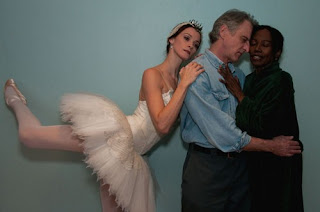stephanie hutchison, john blackwood, lili francks
There have always been three people in Joe’s marriage: him, his wife Jillian and the fantasy of Maria, a ballerina that he met and became enraptured with as a young man. Thus begins Swan Song of Maria, a fascinating mixture of ballet, Swan Lake, Othello and tap dancing that examines issues of race and memory, brought to us by Threshold Theatre and El Destino Productions and played as part of the Next Stage Festival which closed January 16th 2011.
This play was written by Carol Cece Anderson and there is much in it that is really fascinating. It begins near the end of the story, with Joe, a playwright, caring for his wife, a former tap dancer named Jillian, who is in the later stages of Alzheimer’s disease. Yet, while Jillian is mostly disengaged from reality, it is Joe who is being haunted by his past, as he sees Maria, as does the audience, in all her former glory, as he tells Jillian the story of how he met the beautiful ballerina. The insinuation that the writer is similarly lost and disconnected makes the relationship between the two increasingly strained.
There are a lot of really interesting issues raised throughout this piece. Jillian is black and Joe is white and she continually accuses him of marrying her “as part of the revolution,” suggesting that his youthful ideals for equality and freedom had dictated their marriage rather than love. She claims, instead, that he has always been in love with Maria, the pallid “inscrutable Madonna.” Like Othello, Jillian becomes paranoid and adamant that her entire relationship with Joe has been a sham, and, furthermore, an abject failure of the optimistic dreams of their youth. Through Joe we begin to question the role of a muse in the artist’s life. How much is his love for Maria, his desire to keep her at the forefront of his mind and his heart, sucking the affection and passion out of his marriage to Jillian?
As a playwright, Anderson is very gifted at giving Joe beautifully poetic words to say and for weaving so many ideas realistically into one piece. I did find that a challenge with this play was that it was almost so weighty, nearly unrelentingly so, that it actually decreased my empathy for the characters and kept me from being moved as I would have been had there been more humour and more light represented in the story. There are flashbacks when Joe and Jillian are said to have been youthful, idealists, and yet they are not written as being youthful or idealistic. Instead they fight about the same issues they fight about as an older couple and have a weightiness bogging them down that is inconsistent with the freedom loving revolutionary spirit that Anderson speaks about, but does not actually capture. So much of the potential for sadness in this play is the loss of Joe and Jillian’s grand dreams, and their failure to achieve an ideal that they once clung to so ardently, but this tragedy is never fully realized.
Lili Francks and John Blackwood play Jillian and Joe and they also never quite capture their own youthful spirits. Francks is brilliant in portraying Jillian when the Alzheimer’s has completely taken over her body and her eyes are blank so it is chillingly like her soul has already flown from her body. She is delightful in her tap dance to “If My Friends Could See Me Now” from Sweet Charity (cheoreographed by Debbie Wilson), which is the most joyful moment in the play. I found that part of the problem in relating to Jillian and Joe as a couple is that there is no real intense romantic chemistry between Francks and Blackwood that makes you see the desire they once had, so there is no mourning for the loss of that either. Blackwood is fantastic in his monologues, the stories that he tells captivatingly about his past with Maria, but he is more wooden in his dialogue which also adds to the strange dynamic between him and Francks.
Stephanie Hutchison dances gorgeously as Maria and certainly looks like a sweet angel under the lights. She is mesmerizing as she executes Roberto Campanella’s choreography accompanied by Hilario Durán on keyboard. It seemed like a strange choice to have Hutchison herself remain silent throughout the play, but to have Maria’s lines spoken by Francks, as Jillian. I wasn’t sure if it was intentional, but the dialogue given to Maria made her sound whiny and dull, which popped the bubble that perpetuated the myth of her being an untouchable paragon of magnificence. Having Jillian speak her lines further distanced us from Maria and oddly distorted the story. The rest of director Mark Cassidy’s work flowed well, overlapping fantasy, reality, present and past in an always clear and distinct way.
There is much to be admired in this play, yet also, I think the potential is there for this Swan to emerge again an even more taut and powerful tragic fairytale.







